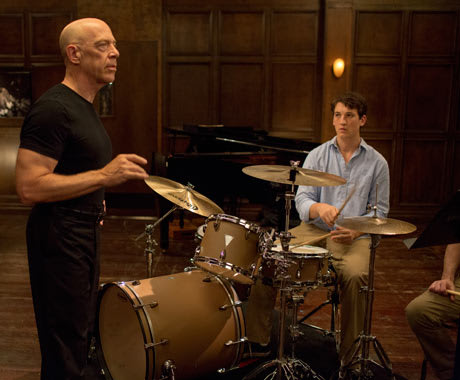Having already wowed audiences at Sundance and Cannes, Whiplash presumably finishes its festival run here at TIFF, achieving the rare treble of A-list film festivals. And so it's no surprise that Damien Chazelle's jazz-drumming picture is a dynamo of cinematic entertainment, a rip-roaring musical thrill ride of monumental proportions.
Andrew Neyman (Miles Teller) is a wet-behind-the-ears teenaged drummer and freshman of an esteemed music school. He aspires to be one of the greats, the first step of which means getting into the jazz orchestra conducted by notorious ball-busting prick Terence Fletcher (J.K. Simmons). Fletcher's methods of intimidation are legendary, and when Neyman passes his test, he becomes the latest punching bag for Fletcher's aggressive educational tactics.
There's really just one theme at play in Whiplash, the idea of the dedication of great artists to their craft. While the outcome and trajectory of the film is not hard to spot, writer/director Chazelle is so laser-focused that the ride is a thrill to behold. It's hard not to compare this to Darren Aronofsky's surreal journey of his prima ballerina in Black Swan, but put through a different kind of grinder — an intense staring contest for the ages with the music teacher from hell.
Straight from the mould of R. Lee Ermey's drill sergeant character in Full Metal Jacket, Fletcher's methods run from physical to emotional abuse. But it's psychological games that drive Neyman to the brink, with only minor victories, such as a nod of appreciation or a look of approval, providing solace for him. Still, it's enough to keep Neyman going where others have failed.
Cinematic bravura bursts from the picture's classically composed frames: gorgeous warm lighting complements the sense of history of the jazz numbers their artists play; dynamic editing, intrusive compositions, fetish-like close-ups of Neyman's drum kit and long extended takes of Teller ripping his skins creates a dynamic energy; and Simmons and Teller are perfectly matched with each other acting-wise, giving two equally intense, laudable and award-worthy performances.
While we get to see Neyman's domestic life with his single father, a failed writer himself, and an attempt at a relationship with a young neighbourhood gal, Chazelle keeps his narrative sparse and retains his remarkably simple and identifiable theme. Despite the simplicity, Chazelle confidently skirts clichés and thus achieves a kind of perfect formula, much like Rocky's rags-to-riches underdog sports story. With all storytelling elements working in sync, this film achieves the same kind of perfection Chazelle's characters strive to achieve.
It has a doozy of an ending, too, a classic showstopper that will leave audiences breathless and delirious. If this film doesn't become a hit then cinema truly is dead.
(Mongrel Media)Andrew Neyman (Miles Teller) is a wet-behind-the-ears teenaged drummer and freshman of an esteemed music school. He aspires to be one of the greats, the first step of which means getting into the jazz orchestra conducted by notorious ball-busting prick Terence Fletcher (J.K. Simmons). Fletcher's methods of intimidation are legendary, and when Neyman passes his test, he becomes the latest punching bag for Fletcher's aggressive educational tactics.
There's really just one theme at play in Whiplash, the idea of the dedication of great artists to their craft. While the outcome and trajectory of the film is not hard to spot, writer/director Chazelle is so laser-focused that the ride is a thrill to behold. It's hard not to compare this to Darren Aronofsky's surreal journey of his prima ballerina in Black Swan, but put through a different kind of grinder — an intense staring contest for the ages with the music teacher from hell.
Straight from the mould of R. Lee Ermey's drill sergeant character in Full Metal Jacket, Fletcher's methods run from physical to emotional abuse. But it's psychological games that drive Neyman to the brink, with only minor victories, such as a nod of appreciation or a look of approval, providing solace for him. Still, it's enough to keep Neyman going where others have failed.
Cinematic bravura bursts from the picture's classically composed frames: gorgeous warm lighting complements the sense of history of the jazz numbers their artists play; dynamic editing, intrusive compositions, fetish-like close-ups of Neyman's drum kit and long extended takes of Teller ripping his skins creates a dynamic energy; and Simmons and Teller are perfectly matched with each other acting-wise, giving two equally intense, laudable and award-worthy performances.
While we get to see Neyman's domestic life with his single father, a failed writer himself, and an attempt at a relationship with a young neighbourhood gal, Chazelle keeps his narrative sparse and retains his remarkably simple and identifiable theme. Despite the simplicity, Chazelle confidently skirts clichés and thus achieves a kind of perfect formula, much like Rocky's rags-to-riches underdog sports story. With all storytelling elements working in sync, this film achieves the same kind of perfection Chazelle's characters strive to achieve.
It has a doozy of an ending, too, a classic showstopper that will leave audiences breathless and delirious. If this film doesn't become a hit then cinema truly is dead.
